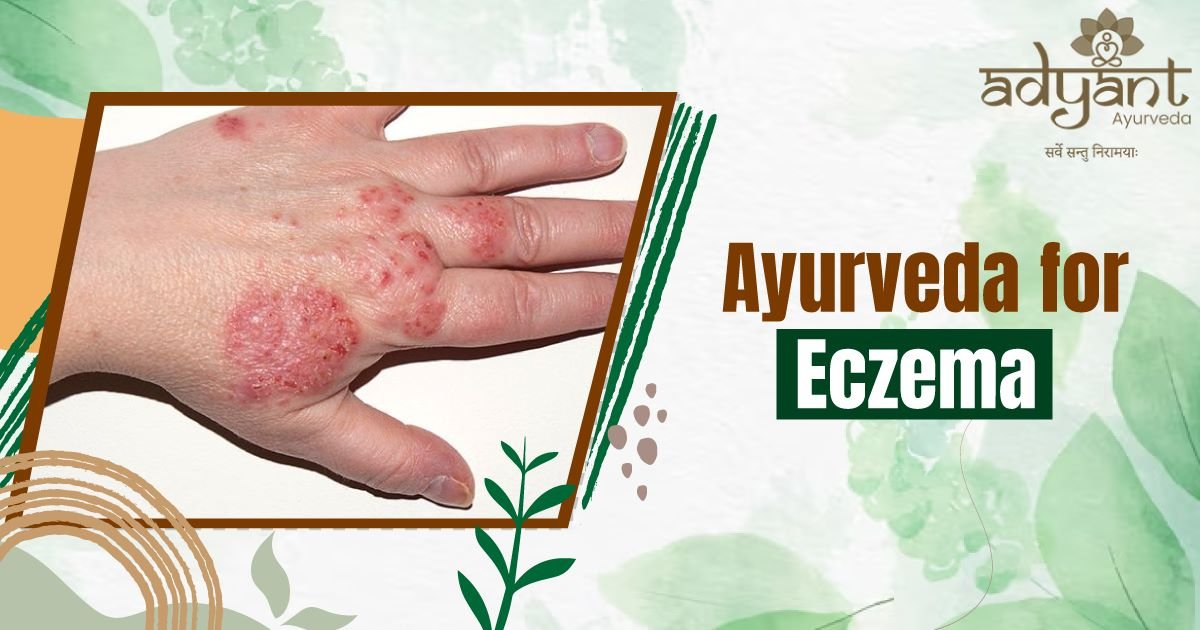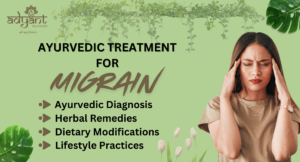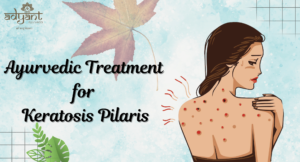Ayurvedic treatment for Eczema: Eczema, also known as Atopic Dermatitis, is a chronic skin condition characterized by red, itchy, and inflamed skin. It can be uncomfortable and even painful, causing distress to those who suffer from it. While there are many conventional treatments for eczema, they often come with side effects and only provide temporary relief. Ayurveda, an ancient Indian healing system, offers a natural approach for Ayurvedic treatment for eczema that focuses on addressing the root cause of the condition.
Adyant Ayurveda is a top Ayurvedic Hospital in Bangalore that offers effective Ayurvedic treatments for a range of health conditions, including eczema. Their team of highly qualified Ayurvedic doctors provides personalized treatment plans that are tailored to each patient’s unique needs.
Click Here: For Free Consultation Download Our App
Ayurvedic Treatment for Eczema: Symptoms of Eczema
Eczema, also known as atopic dermatitis, is a chronic inflammatory skin condition that can cause a range of symptoms. It is very necessary to know the Symptoms of Eczema before Ayurvedic treatment for Eczema. The symptoms are listed below:
- Dry, itchy skin: Intense itching is one of the most common and bothersome symptoms of eczema. The itching can be severe and lead to scratching, which can further irritate and damage the skin.
- Red, inflamed skin: Eczema can cause the skin to become red, swollen, and inflamed, particularly during flare-ups.
- Rashes: Eczema often presents as rashes or patches of irritated skin that can vary in size, shape, and appearance.
- Scaly or crusty patches: In some cases, eczema can cause the skin to develop scaly or crusty patches, which may be particularly noticeable on the hands, feet, or scalp.
- Oozing or weeping: When eczema is severe, the inflamed skin may ooze or weep a clear or yellowish fluid, which can crust over and form scabs.
- Thickened, leathery skin: Chronic or untreated eczema can lead to the skin becoming thickened and leathery, particularly in areas that are frequently scratched or rubbed.
- Skin discoloration: Eczema can cause the affected skin to become discolored, appearing darker or lighter than the surrounding skin.
- Cracked or blistered skin: In some cases, eczema can cause the skin to crack or develop small, fluid-filled blisters.
- Sleep disturbances: The intense itching associated with eczema can disrupt sleep, leading to fatigue and irritability.
The symptoms of eczema can vary from person to person and may also depend on the specific type of eczema, the age of the individual, and the severity of the condition. Additionally, eczema is often associated with other conditions, such as allergies, asthma, and hay fever.
What is Eczema According to Ayurveda?
According to Ayurveda, eczema is considered a type of Kushtha, which is a broad term used to describe various skin diseases or disorders. Ayurvedic texts classify eczema under the category of Kshudra Kushtha, which refers to minor or less severe forms of skin diseases.
In Ayurvedic principles, eczema is believed to be caused by an imbalance of the three doshas (biological energies) – Vata, Pitta, and Kapha – along with the accumulation of toxins (Ama) in the body. The specific dosha imbalance and the underlying cause may vary depending on the individual’s constitution (Prakriti) and the type of eczema.
You May Also Like: Ayurvedic Doshas: The Complete Guide
Ayurvedic Treatment for Eczema: Ayurvedic view
Ayurvedic Treatment for Eczema includes balancing the doshas. In the Ayurvedic view eczema is 3 types which are listed below:
Vata type: When Vata dosha is predominant, eczema may present with dry, rough, and cracked skin, along with excessive itching and burning sensations.
Pitta type: If Pitta dosha is aggravated, eczema may manifest as red, inflamed, and oozing skin lesions, accompanied by heat, burning, and irritation.
Kapha type: An imbalance in Kapha dosha can lead to thick, sticky, and oozing eczema lesions, often with excessive itching and a tendency for the condition to recur.
Additionally, Ayurveda considers factors like improper digestion (Agni dushti), accumulation of toxins (Ama), stress, and improper lifestyle choices as contributing factors to the development of eczema.
The approach for Ayurvedic treatment for Eczema in Ayurveda aims to address the root cause of the imbalance, eliminate toxins, and restore the balance of the doshas through a combination of dietary modifications, lifestyle changes, herbal remedies, and specialized therapies like Panchakarma (detoxification and rejuvenation treatments).
Role of Panchakarma in Ayurvedic Treatment for Eczema
Panchakarma plays an important role in the Ayurvedic Treatment for Eczema (Kushtha or Kitibha in Ayurveda). Here’s how Panchakarma treatment can help in treating eczema:
- Detoxification (Shodhana)
- Procedures like Vamana (therapeutic vomiting) and Virechana (purgation) help eliminate toxins (ama) and imbalanced doshas that contribute to eczema.
- Basti (medicated enemas) helps in cleansing the gastrointestinal tract and rectifying Vata dosha imbalance, which is a common factor in eczema.
- Purification (Shodhana)
- Raktamokshana (bloodletting) helps in purifying the blood and removing toxins that can aggravate skin conditions like eczema.
- Nasya (nasal administration of medicated oils/herbal preparations) helps in purifying the head and neck region, which is important in certain types of eczema.
- Oleation (Snehana) and Sudation (Swedana)
- Abhyanga (oil massage) and Swedana therapies help in reducing dryness, itching, and inflammation associated with eczema.
- They also help in softening and eliminating toxins from the body, which can contribute to eczema flare-ups.
- Rejuvenation (Rasayana): Rasayana therapies, such as Basti and Nasya with rejuvenating herbal formulations, help in improving overall health, enhancing immunity, and promoting skin health.
- Stress Reduction: Therapies like Shirodhara (pouring of warm medicated oil on the forehead) and Dhara (pouring of medicated liquids) help in reducing stress and promoting relaxation, which can be beneficial in managing eczema flare-ups.
Read More: Panchakarma Treatment
Best Ayurvedic Treatment for Eczema
In Ayurveda, for Ayurvedic treatment for Eczema, It is necessary to balance the Pitta dosha, which is responsible for regulating metabolism and digestion. When Pitta is out of balance, it can cause inflammation in the body, including the skin, leading to eczema.
The approach for Ayurvedic treatment for eczema involves identifying the root cause of the condition and addressing it through dietary and lifestyle changes, herbal remedies, and various Ayurvedic treatments.
Dietary and Lifestyle Changes
Dietary and lifestyle changes play a crucial role in the Ayurvedic treatment for eczema. Patients are advised to avoid foods that aggravate the Pitta dosha, such as spicy and sour foods, alcohol, and caffeine. Instead, they are encouraged to eat a diet that is rich in cooling and nourishing foods, such as fresh fruits and vegetables, whole grains, and healthy fats.
Lifestyle changes that can help manage eczema include practicing stress-reducing techniques like yoga and meditation, avoiding hot showers or baths, wearing loose, comfortable clothing, and avoiding exposure to harsh chemicals and irritants.
Herbal Remedies for Ayurvedic Treatment for Eczema
- Neem (Azadirachta indica): Renowned for its anti-inflammatory, antibacterial, and antifungal properties, neem is widely used in the form of pastes, oils, or decoctions to alleviate eczema symptoms.
- Manjishtha (Rubia Cordifolia): This herb has potent blood-purifying and detoxifying properties, making it useful in treating eczema associated with toxin accumulation.
- Haridra (Curcuma longa): Commonly known as turmeric, haridra is rich in curcumin, which has anti-inflammatory and antioxidant effects, helping to reduce inflammation and itching.
- Guduchi (Tinospora Cordifolia): This herb is known for its immune-modulating and anti-allergic properties, making it beneficial in managing eczema triggered by allergies.
- Aloe Vera (Kumari): The gel from the aloe vera plant is cooling and soothing, providing relief from itching and inflammation in eczema.
Read Also: Ayurvedic Skin Care Treatment
Ayurvedic Treatments for Eczema
In addition to dietary and lifestyle changes and herbal remedies, Ayurvedic treatments can also be used to treat eczema. At Adyant Ayurveda, patients receive personalized Ayurvedic treatment plans that are tailored to their individual needs. The treatment process begins with an in-depth consultation with one of the clinic’s experienced Ayurvedic doctors, who will take the time to understand the patient’s medical history, lifestyle, and unique constitution.
Based on this information, the doctor will develop a personalized treatment plan that may include dietary and lifestyle changes, herbal remedies, and various Ayurvedic treatments.
Adyant Ayurveda offers a range of Panchakarma treatment in Bangalore that are designed to promote health and well-being.
Panchakarma, a series of Ayurvedic detoxification treatments, may be recommended to remove toxins (Ama) from the body. Therapies like Virechana (purgation) and Vamana (emesis) can help in eliminating accumulated toxins, which may be contributing to eczema.
- Abhyanga is a full-body massage that uses warm herbal oils to promote relaxation, improve circulation, and nourish the skin. This treatment can help soothe inflamed skin and reduce the symptoms of eczema.
- Shirodhara is a calming therapy that involves pouring warm herbal oil over the forehead in a continuous stream. This treatment can help reduce stress and promote relaxation, which can benefit patients with eczema.
- Nasya treatment involves the administration of herbal oil or powder into the nostrils. This treatment can help improve respiratory health and reduce inflammation in the nasal passages, which can benefit patients with eczema.
- Lepa (Herbal Pastes): Medicated pastes made from herbs like neem, haridra, and manjishtha are applied topically to the affected areas to provide relief from itching, inflammation, and dryness.
Overall, Adyant Ayurveda provides patients with effective Ayurvedic treatments for eczema and a range of other health conditions. Their Best Ayurvedic Doctor for Skin in Bangalore and therapists offer personalized care and support to help patients achieve optimal health and well-being.
Read Also: Virechana Treatment
Conclusion
Eczema can be a frustrating and uncomfortable condition that can significantly impact a person’s quality of life. However, Adyant Ayurveda offers a range of effective Ayurvedic treatments for Eczema that can help alleviate the symptoms of eczema and improve overall health and well-being. Adyant Ayurveda, the best Ayurvedic clinic in Bangalore, provides personalized and effective treatment for eczema and other health conditions.
Their team of experienced Ayurvedic doctors and therapists offers a range of treatments that are tailored to each patient’s unique needs, including Panchakarma, Abhyanga, Shirodhara, and Nasya. These treatments can help reduce inflammation, detoxify the body, and promote relaxation, all of which can be beneficial for patients with eczema.
Read Other Related Blogs:







